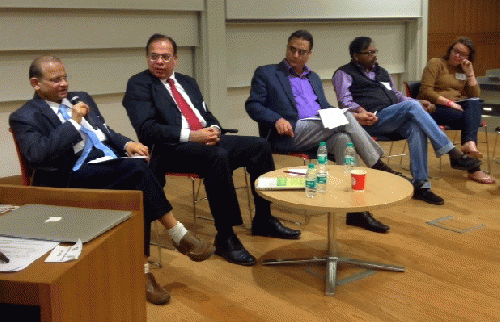
Panel discussion on tuberculosis & human rights
(Image by Citizen News Service (CNS): citizen-news.org - 2014) Details DMCA
A rights-based approach to TB focuses on the underlying determinants and establishes the rights of people living with, and vulnerable to, TB.
Public health strategies for TB care and control need to look at the disease as well as the well-being of the person. If key affected populations (KAP) are made equal partners in planning, decision-making, and implementation processes, we are bound to get better outcomes. Improved health benefits are achieved through beneficiaries being aware of their health entitlements and rights and through targeted advocacy.
Mihir Mankad, Health Policy Advisor, Save the Children UK, and Brian Citro, Lecturer in Law University of Chicago Law School, emphasized that a rights-based approach to TB involves:
- Individual protections--right to be free from discrimination, right to privacy, right to informed consent;
- Individual entitlements--right to testing and treatment, right to information, right to social and economic determinants of health (food, housing, sanitation, water); and
- Government obligations to ensure equal access to health for all by respecting individual rights, fulfilling entitlements, regulating private sector and ensuring adequate, equitable and sustainable financing.
Professor SK Sharma, Head Department of Internal Medicine, AIIMS, stressed upon the primordial prevention of TB--improved standard of living, better education, availability of quality-assured drugs, and vaccine development, among others.
He pleaded for protecting human rights of not only the TB patients but also of the healthcare providers and others exposed to the TB bug--3% of those exposed to the infection (in overcrowded public transports, railway stations, hospitals, and unsanitary surroundings), will get infected, very often through no fault of theirs. 'Air, which transmits the TB bacteria, cannot be boiled or autoclaved,' argued Prof Sharma. So the mantra is --treat TB effectively, prevent transmission and protect human rights of all, he said.
Mentioning that 'There is a negative correlation between Human Development Index and annual TB incidence rate,' Dr Kiran Pandey of University of Chicago, regretted that we have failed to address structural barriers for a rights-based approach to health in general and TB in particular, even though 'TB is just not a biomedical phenomenon, but the sum total of individual vulnerabilities and inadequate health systems.'
Sharing examples from different countries that have used human-rights law to dislodge patent and intellectual property laws that allow diagnostics and medications to become prohibitively costly, Hannah Brennen emphasized that "right to healthcare means not only providing the drugs but also providing them in a sustainable way. Countries should have budget for not only buying medicines but also for empowering people."
Well-known lawyer and Director of HIV/AIDS Unit of Lawyers Collective, Anand Grover, lamented that, "We do not treat people with respect and dignity. Public health centres do not treat patients with respect. We have a very good programme but we do not involve the community. We have to treat people living with TB with respect and dignity. Together with having a rights-based approach, we need to mind our language too. Participation of KAP is an important component of the 'Right to health framework'. Autonomy of the individual is the most important part of human rights. The right to confidentiality and privacy of patients must be respected. There must be informed consent for TB testing; pre- and post-treatment counselling; information sharing about benefits and risks involved with treatment (including the importance of treatment adherence to avoid resistance). Empowerment of TB community will give better outcomes."
Blessina Kumar, Chair, Global Coalition of TB Activists, agreed that barriers to human rights can increase vulnerability to TB, reduce access to TB care and control, and reinforce stigma. Human-rights interventions should be integrated into national plans and affected communities should be treated as a critical part of health-delivery system.
According to Dr Homa Mansoor of Medicins Sans Frontieres (MSF), having a programme-centric rather than patient-centric approach and stigma and discrimination associated with TB are barriers that have to be addressed through context-specific rights-based approaches rather than one-size-fits-all formula. NTPs should engage in context-specific approaches that include: patient-centric initiatives, treatment literacy and support, interventions responding to different needs of KAP, and participation of community at all levels of decision-making.
There is indeed a need to articulate the legal obligations of governments and non-state actors, like private health providers and drug manufacturers, to ensure that good-quality TB testing and treatment are available and accessible to those in need. We can close the existing gaps by strengthening communities and encouraging meaningful communication between healthcare providers and patients/receivers, all along holding hands with the governments rather than pointing fingers at them.
And as Case Gordon of IMAXI, Cooperative, and the person who played the key role in around 'Patients Charter for TB Care' said (via video conferencing), "Know your rights and fulfill your responsibilities. Share information, follow treatment and contribute to community health through solidarity. TB control should not overshadow TB care. Any discussion on TB should involve participation of people who are affected and have lived experience of it. We need to break the barriers to build the rights."
Shobha Shukla, CNS
(The author is the Managing Editor of CNS. Email: shobha|AT|citizen-news.orgEmail address, website: www.citizen-news.org)
- Shared under Creative Commons (CC) Attribution License





